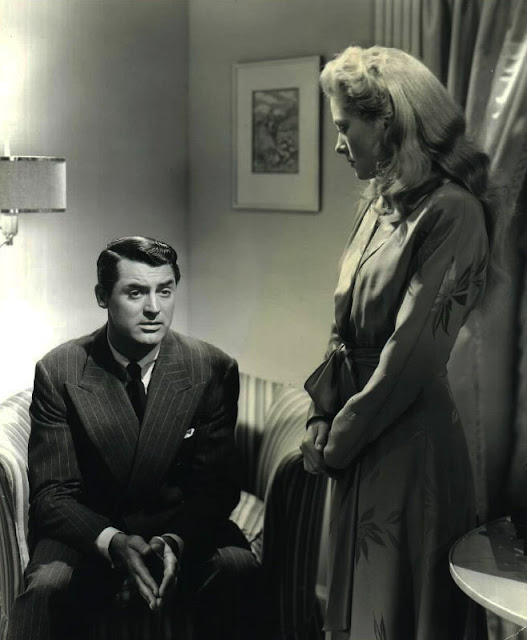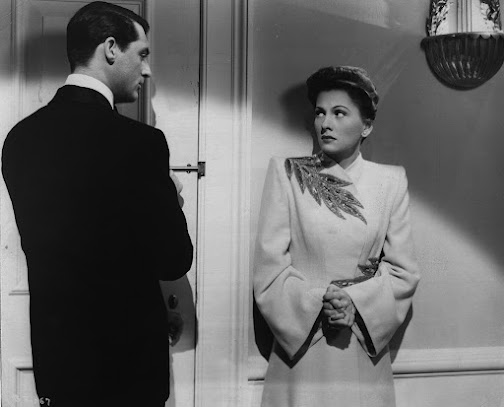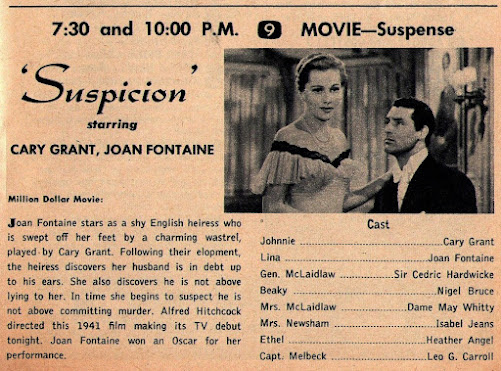Anything But a Happy Ending
Off the Grid Again: This Time, Suspicion
Said Greenbriar, September 14, 2009: “Suspicion remains a frustration for me, and I don’t think that’s ever going to change.” Well, it has changed, utterly. Most who read GPS have seen Suspicion. Being increasingly of changeable mind, it comes late but not too late for me to recognize Suspicion as most stealth of Hitchcock creations, “Johnnie Aysgarth” (Cary Grant) getting away with one murder and certain to escape penalty for a next that will follow end titles. Why did I not gather this before? Will admit to being alone (?) in now-interpretation of Suspicion, no critics nor Hitch historians so far who saw/see the story in terms I do, so maybe it is delusion that drives me. If so, by all means unmask jester I’ve become, as it will not be my first time so doubted. Why discuss movies if not to take sometime radical account of them? Like Cody freely said, Maybe I am nuts. Hitchcock, claims me, knew what he was doing and got satisfaction upturning critic and audience assumption, perhaps a deftest trick a great director ever played. Did he compromise Suspicion's finish, cop-out, give-in to Code limits? Scholars say yes, and I till recent believed them. No more. Suspicion a runt among Hitchcocks as averred in 2009? Not now. Suspicion as of 2023 tickles edge of one-hundred list I hope to complete eventually: let’s make it 101 for present consideration. How about blanket-101 for ongoing placement of films that so far haven’t make premium grade. Will a next twenty years see these overtake Top One-Hundreds? Remind me in 2043 and we’ll review how chips fell in the meantime.
Notion that no way could charming Cary Grant be a killer was what allowed Suspicion to skate past bar set by fans and censorship, but were any aware, then, or today, of Hitchcock’s truer intention? It was easier in 1941 to discount possibility of Cary killing, remains so to a degree, though Notorious and even Charade let us glimpse possibility that Grant harbors ill-intent. Consider number of likeable leading men who'd turn lethal as cynicism dialed up, then stratified finally in modern films to make such spins almost expected. Suspicion proposes that Cary Grant's Johnnie is simply too good to be true. We if not 1941 audiences regret Grant didn’t practice more along such line, but what of youth seeing Suspicion fresh today? To minds unencumbered by familiarity with him, the question might better be, why not Cary Grant doing murder? His Johnnie is a deadbeat at first sight, seating himself in a first-class train compartment his ticket does not entitle, cadging from “Lina” (Joan Fontaine) a postage stamp that will make up the rate difference. Johnnie is a user who relies on facile charm and inborn talent to lure vulnerable women. We don’t know if he’s been married before but suspect he has. Is ground filled already with previous Aysgarth wives? No Hitchcock character not a killer came before or after with so much baggage or spent as much screen time unpacking it. Could anyone other than Grant as Johnnie get by on such bad behavior? Lina is reading a book on child psychology when she should read one on predatory men, her an ideal target Johnnie identifies right away. Being “a carefully brought-up young lady” cinches Lina as quarry Johnnie will easily track and ultimately kill, if offscreen, and after we have left the theatre.
Lina is no patsy for Johnnie, being on to him from their first meeting, helpless however because love-at-first sight clouds her better judgment. It frustrated me that she would tolerate such a bounder and as result Suspicion seemed an unworthy Hitchcock. Did I not understand the nature of people where blinded by love? To be disarmed like Lina might happen to anybody. How often do we say of others, How can he/she live with her/him? We accept Lina’s thrall for Johnnie's overwhelming charm and attractiveness. Audiences would have said sure, for after all, he’s Cary Grant. Hitchcock knew this and realized his public would buy Lina’s response to Johnnie despite improbabilities. For how many would Johnnie selling the chairs be a deal breaker, let alone stealing money at work, and from his cousin yet. Johnnie is self-possessed and presents himself as a most eligible bachelor. Other women see him a same way and make no secret of it, Lina influenced despite misgivings she otherwise has. How many hang on in relationships because the person alongside them looks good enough to make them look good? Surface can compensate for reality where one is admired for benefit others imagine he or she has. Lina was slated for old maidhood. Even her parents acknowledged it. Johnnie coming to rescue means she’ll forgive a lot, almost anything, to keep him. Only when murder becomes a possibility does Lina balk, even then tentatively. There are indicators, Johnnie a card-cheat they say, stole a wife from her husband maybe. He seems to manhandle Lina in a long shot that words will not explain away (“What did you think I was trying to do, murder you?”), flags raised before the marriage, plus Johnnie telling Lina that she would be better off shed of him, “I think I’m falling in love with you and I don’t quite like it” enough warning to cool ardor, but who’s sensible in such emotionally charged circumstance?
Suspicion then is “Hollywood” writ large but has whiff of real life and how many experience it, despite thinking they’d not buy blandishments of a Johnnie Aysgarth. Lina exults in Johnnie’s glow as it reflects on her. Parents and friends will no longer think her a loser and wallflower, trophy that is Johnnie to surpass any they’d expect for her. Johnnie is even of Lina’s class, though there is something of the gatecrasher about him. Is she better off despite his irresponsibility and evident fortune hunting? Lina is not unlike Catherine Sloper in The Heiress, who maybe should have opened doors to a pleading Morris Townsend. He was Montgomery Clift after all, and Catherine could never get a show pony like him again. Suspicion stakes are higher of course because Johnnie may be, is I think, a killer, and that’s what makes Hitchcock’s a dangerous game. Lina imagines she can contain Johnnie by treating him as a child: “I’m just beginning to understand you. You’re a baby,” this mere weaponry he’ll use to further manipulate her. Johnnie’s best friend “Beaky” (Nigel Bruce) is a houseguest who confirms for Lina her husband’s guile but surprises her (and us) when he goes along with a grandiose real estate scheme Johnnie has cooked up. Lina has Beaky sized up as well: “Isn’t it time you grew up?,” while it is Lina who needs to grow up and adjust a patronizing attitude toward others in her life. She’ll begin to suspect during a Scrabble-like game called “Anagrams” that Johnnie is plotting to kill Beaky, this a segment sixty-two minutes into the feature that would demonstrate Hitchcock’s mastery of suspense in compilations to come. More unsettling however is Johnnie’s cold reaction when Beaky unwisely drinks brandy and has an allergic reaction to it. “He should have known better. One of these days it will kill him.”
Johnnie plans a trip to Paris with Beaky, supposedly to cancel the land deal, but Beaky dies there for overdrinking brandy again. There is conversation later to clear Johnnie, vague enough to allow all sorts of ways he could have been present and did in fact arrange for Beaky to have the drinks. I am satisfied that Johnnie arranged Beaky’s death and got away with same, convinced as well that Hitchcock left doors wide for viewership to reach a same conclusion. Here was cleverest trickery up a Master’s sleeve, but he could not boast of it at the time, nor later when to do so would alert Code authorities of a hoodwink and resolve them never to trust him again. Hitchcock was not an only filmmaker cunning enough to outwit limits, though none of others I’m aware of did it to such degree as he does with Suspicion. Did any review at the time dig sufficiently down to expose the circumvention, 1941 early perhaps to detect insidious masks Hitchcock wore to tangle us and those who oversaw him? Did Cary Grant on seeing Suspicion puzzle out Hitchcock’s intent, or was he like others just puzzled? Again, I’ll admit possibility that the one deluded is me. Every consumer has his/her option to receive art on chosen terms. Mine re Suspicion deepens enjoyment ten-fold. What other films have hidden values yet to discover? Much of what I see nowadays yields secrets not detected before. To point that is poison milk: Yes, it was poison. Why would Johnnie express interest in undetectable lethal dosage and borrow an author friend’s book on the “Palmer (poisoning) case” without a specific purpose for doing so?
Suspicion wrap-up where Lina concludes it was Johnnie's intent to off himself makes little sense, her more grasping at straws than facing facts. Johnnie has merely noted that Lina did not drink her milk and so segues to Plan B, which he will also abandon readily as he did the real estate venture (but wait, did Johnnie ever intend anything other than Beaky escrowing the cash in both their names, cash Johnnie would collect upon settlement of Beaky’s estate?). Johnnie is deviant enough to switch on a dime. Suppose he figures to dispose of Lina during their drive to her mother’s, an idea too offhand even for reckless Johnnie to consider, but necessary after the milk scheme failed and he had to concoct something else. Johnnie must meditate upon crimes to execute them successfully, per Beaky and likely others prior to this narrative. To liquidate Lina on the road, let alone pitching her off a cliffside, is a plan rife with loose ends. How to account for her fall, and why would they pause at such a precipice in the first place? Changing his mind amounts to nothing more than a delay for Johnnie. Besides, Lina unknowingly gives him an out, suggesting he intended to kill himself for having put them in financial distress. Her intense and ongoing love for Johnnie obliges Lina to rationalize his conduct, and as before, Johnnie will seize upon something Lina says to forward a strategy her words inspire. So he'll “return home to face a prison term”? Like hell he will. Control remains altogether his. Lina begs Johnnie to drive her back, and by “persuading” him to do so, seals her own fate.
He’ll not kill her today but certainly will later, given better and safer opportunity. Lina perceptive? She is anything but, suicide a joke to a practiced sociopath like Johnnie, who may now anticipate not only Beaky’s money, but Lina’s family inheritance when her mother dies, plus life insurance on Lina herself once timing is right for Johnnie to achieve his aim, a round robin that will allow Johnnie to prosper and graze further upon nobility reckless enough to invite this merry widower among their circles. Truest words Johnnie speaks to Lina: “People don’t change overnight, Lina. I’m no good.” Again an admission (mine) that I could never fully trust Cary Grant. There was always too much hidden about his screen characters. Did it have to do with Grant's persona being altogether a creation, little if nothing to do with the person Archie Leach was? Players I cleave to mirror more what they play, at least seem to. Cary Grant ideally suited Hitchcock for deceiver qualities he had. I don’t think there was an actor anywhere who could embody Johnnie Aysgarth so well. We believe in Grant/Johnnie’s ability to dominate and control a romantic partner. Hitchcock asks us, specifically asks women watching, if dying is a worth-it price to pay for rapturous here-and-now. Nothing so good lasts long anyway, and if Lina loses Johnnie, what’s to live for? Proposed ending where she willingly drinks the poison was clever but would not have worked so well as truly transgressive finish Suspicion does have. Lina will pay the price of love and gift to her vanity such love represents, but not where we will witness it, being an event happening amidst ether where all movies go after end titles fade off.














8 Comments:
I've not seen "Suspicion", but just recently watched "Downstairs", with John Gilbert playing a similar "ladies' man" - Gilbert portrays a perceptive man full of nothing but self-interest, with a quick and ready wit for telling the manipulative lies and half-truths he directs at the ladies he targets for sex, money and power - but in 'Downstairs', Gilbert isn't playing an actual nor suspected murderer.
Reading this item has gotten me thinking that Grant could have played that Gilbert role very well.
I've never been a fan of "Suspicion" - but thoroughly enjoyed reading your radical reinterpretation. In fact, I may give the picture another try just to see if watching it with the mindset you've proposed elevates the enjoyment level.
Would like to think "Suspicion"'s finale (as you've painted it) provides an early preview of Hitchcock's brilliantly unsettling ending for "The Birds" - with immediate disaster dodged but the avian antagonists still perched everywhere, ready for the next deadly strike.
Hitchcock's planned ending was Grant nonchalantly mailing Fontaine's letter after the poisoning, unaware it would expose him. That, ironically, would have been code compliant in that it promised legal consequences.
A little later in Hitchcock's "Shadow of a Doubt", the serial killer DOES get away with it, after a fashion. When a murder attempt ends with his own accidental death, he's mourned as a good man.
The production code was a real hurdle for film makers of the calibre of Hitchcock. Basically it forced film makers to lie. Great post.
Or in Hitchcock's case, clever
Think it was on the "Shadow of a Doubt" DVD that Hume Cronyn recalled Hitchcock telling him something like, "The camera lies. We have to help it."
Yes, the production code was bad ... EXCEPT for those times it made the director and/or the writer find imaginative ways to suggest adult behavior or situations.
Dan Mercer shares some thoughts about SUSPICION:
Yours is a brilliant take on "Suspicion" that resolves the long-standing problem of the film, that either it has a compromised ending or that only by having Johnnie Aysgarth murder Lina could it have been faithful to its theme. But the supposed ending that was originally intended, of Johnnie murdering Lina and then lightheartedly dropping her incriminating letter into a postal box, could only have been a macabre joke that would have pleased no one, had it been filmed. It sounds more like one of Hitchcock's anecdotes, when he was trying to be deliberately outrageous. Your insight, that Johnnie remains a sociopath and that all of Lina's suspicions were well taken, makes perfect sense. Reading it, I could only say to myself, "Of course," as I do whenever I encounter an insight that seems so obvious, once it has been revealed. Certainly, the wounded little boy he played at the end, so contrary to everything he was before, can only be justified as a measured act of pragmatism. He remains a killer without scruples and Lina will surely be confirmed in what she suspects, when he does away with her, but only when it is convenient for him to do so. Alas, for poor Lina, her overwhelming desire for love is inextricably entwined with a need for self-sacrifice that must be gratified. Such subtlety confounds the banality of that last scene, at once making it palatable to the powers that be and an audience wanting its own fears to be allayed, while utterly undermining it. Certainly, this betrays the touch of the master himself.
Post a Comment
<< Home